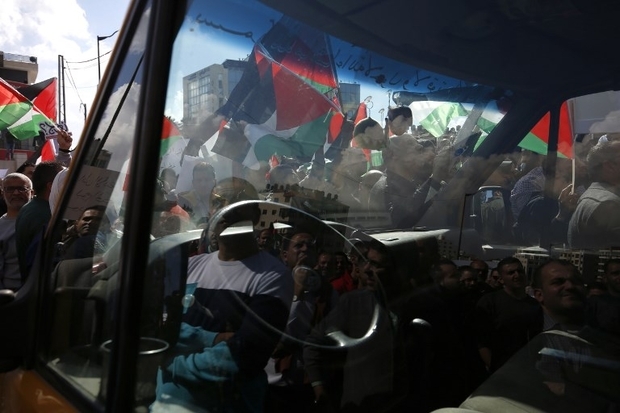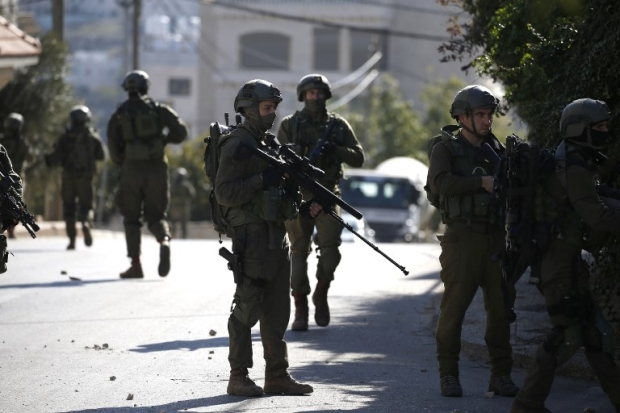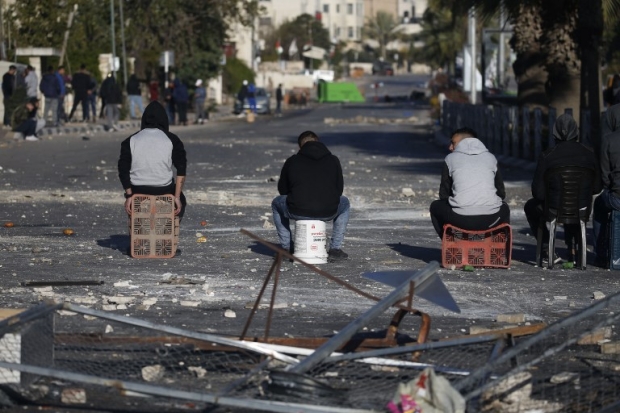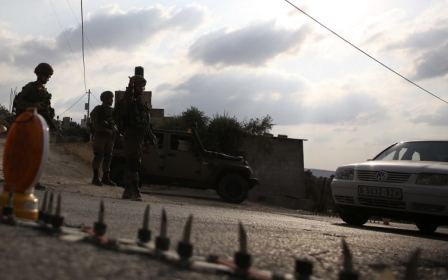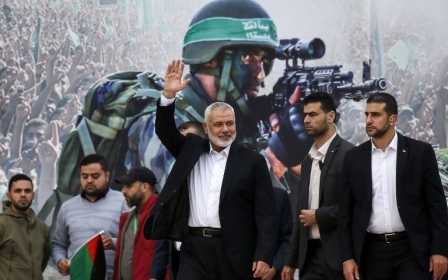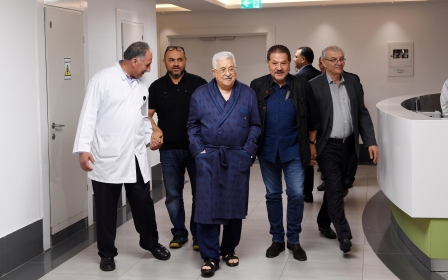After spate of West Bank violence, PA under pressure to stay relevant
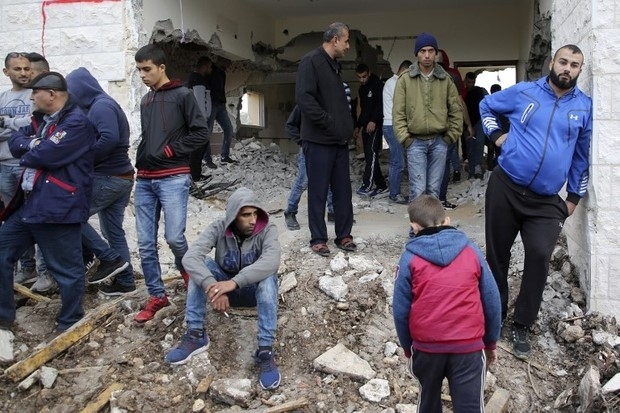
(AFP)
RAMALLAH, Occupied West Bank – After a week of drive-by shootings and stabbings, the killing of Palestinians by Israeli forces, and military raids, arrests and demolitions, uncertainty lingers over the political and security implications for the occupied West Bank.
While Israel has blamed the disparate attacks on Hamas, analysts tell Middle East Eye that the incidents involved lone perpetrators and instead reflect tensions among Palestinians in the West Bank that have reached a boiling point.
People have lost all hope. This is not Hamas – this is the people'
- Mohammad Daraghmeh, analyst
Increasingly, they say, the Palestinian Authority which has governed the West Bank for more than two decades is coming to a critical juncture and will be forced to make bold changes to stay relevant.
“These events remind me of the First Intifada (popular uprising). There were many individual attacks, but the anger is widespread,” Mohammad Daraghmeh, a Ramallah-based political analyst, told Middle East Eye. “People have lost all hope. This is not Hamas – this is the people.”
Starting on Wednesday evening, the Israeli army killed four Palestinians in separate operations over a span of 24 hours, claiming they were responsible for attacks on Israeli settlers and police.
Among those killed was 23-year-old Ashraf Naalweh whom the Israeli army shot dead in Nablus after a two-month manhunt, alleging he killed two settlers in October.
The army also killed 29-year-old Saleh Barghouthi that night, accusing him of being behind a drive-by shooting near Ofra settlement that wounded seven settlers on Sunday. A baby born prematurely to a woman wounded in the attack died in hospital.
Naalweh and Barghouthi were followers of Hamas, the armed resistance movement in the occupied Gaza Strip. The group saluted the attacks and said resistance was still alive in the occupied West Bank, but stopped short of saying it had given direct orders for the attacks.
Israel responded by launching a campaign of arrests, enforcing a military closure on Ramallah and unleashing its forces on the Palestinian territories as they searched for other Palestinians who carried out attacks and fled the scene.
Israeli jeeps drove into city centres, stationed themselves near the presidential compound in Ramallah, and raided the official Palestinian news agency offices in the city as well as homes and businesses.
The Israeli raids and arrests continued over the weekend. Early on Saturday, the army blew up a four-storey residential building in the al-Amari refugee camp in Ramallah. The building belonged to the Abu Hmeid family, whose son Israel says killed a soldier in May.
And, on Sunday night, the military demolished Ashraf Naalweh’s home in the village of Tulkarem, four days after he was shot dead.
Palestinian Authority’s limited power
Among Palestinians in the West Bank, there was an increased sense of community. Activists sent out calls to stores and homes with security cameras to erase any footage and destroy their cameras to protect the identity of the Palestinian fighters as soldiers tried to seize tapes.
The contrast between their solidarity and the PA's general inaction has implications for how the PA will operate going forward, particularly whether it chooses to continue, as it has for years, to share intelligence with Israel, said Daraghmeh.
To remedy the situation, Daragmeh said, the PA will have to decrease its security coordination “to a much lower level”.
It was the Oslo Accords, signed in 1993 and 1995, between the Palestinian Liberation Organisation then headed by the late Yasser Arafat, and Israel, that created the PA.
According to the agreement, the PA was to act as an interim government until a Palestinian state was established in the West Bank and Gaza, with East Jerusalem as its capital.
But 25 years later, a Palestinian state seems ever more elusive. The PA’s sphere of control has been constricted to city centres and it consistently acts to undermine any resistance against the occupation, bowing to Israeli threats and pressures.
Meanwhile, Israel expands its illegal settlements and continues to violate basic Palestinian human rights.
This past week, said Masri, heightened the sense that the PA’s power is limited, showing that Israel can humiliate the leadership “whenever it chooses”.
“This will increase internal pressure from voices within the Fatah ruling political party – voices that are saying we need to get out of this 'peace process' and out of the Oslo agreement, because every time we have martyrs, we know that Oslo dies over and over again,” added Masri.
Popular resistance or Hamas?
While Israel is pointing fingers at Hamas, claiming that the group orchestrated the attacks, the communal solidarity that emerged in the West Bank during the weekend’s events showed that the people cared little for who was behind the operations.
Besides breaking cameras, municipalities and cities across the West Bank opened their homes to anyone who was stuck as a result of checkpoint closures.
Blaming Hamas is Israel’s way of trying to show that the Palestinian people are puppets and do not actually want to engage in resistance – that there are outside parties inciting them to resist
- Ibrahim Ibrash, analyst
Analysts say that while some of the men involved in the attacks were affiliated with the group, they still acted of their own accord, and are part of a wider atmosphere of bubbling anger and frustration in reaction to military occupation.
“Hamas is drained in the West Bank. The PA and Israel do not let it breathe,” said Daraghmeh, who added that the attacks were a result of popular, leaderless resistance.
Ibrahim Ibrash, an analyst in the occupied Gaza Strip, agreed: there has been no proof that the attacks were organised or ordered by any political group.
“These are individuals who take their own initiative to resist the occupation. If any one of these martyrs, or prisoners, has any link to Hamas, [it] does not mean that they acted upon orders from the group,” Ibrash told MEE.
Hazem Qassem, a spokesperson for Hamas in the Gaza Strip, said the “youth in the West Bank have all the reason to carry out acts of resistance against the occupation and their settlers”.
When asked whether the attacks were part of a new strategy for Hamas in the West Bank, Qassem told MEE that the movement “continuously focuses its path of armed resistance on all fronts, including the West Bank”.
“One cannot speak of a new strategy, but the persistence of a fixed, rooted and continuous practice,” Qassem added.
‘Not like before’
Since 2015, when a campaign of individual attacks took off in the form of car-rammings, knife attacks and drive-by shootings across the occupied Palestinian territories, many wondered whether Palestine was witnessing a “new intifada” or uprising, like in the years 1987 and 2000.
Masri, director of Masarat, said a third intifada is already underway, but it has been hard to identify because it hasn’t followed the same pattern as the previous two.
“It comes and goes in waves. Sometimes it is about settlements. Sometimes it is about Khan al-Ahmar [the Bedouin village threatened with demolition]. Sometimes it is about prisoners, and sometimes it is about Marches of Return. It is not like before,” he said.
“Attacks by unaffiliated youth have been more common over the past few years because the political parties do not want to take responsibility for attacks. They may have no capacity to do so. Every village and city is fighting its own battle because there is no leadership or vision.”
While the 2015 attacks were mostly centred in occupied East Jerusalem, the frequency and outcome of the attacks over the weekend in the occupied West Bank has drawn attention.
Youth have emerged to the front lines, risking their lives to confront heavily armed soldiers.
“It is obvious that the Palestinian street is willing to put up a fight,” said Daraghmeh.
“Any initiative to launch a popular resistance movement will be embraced. It will succeed if there is someone to lead it, and if there isn’t, it will be fragmented and led by youth, and will be implemented spontaneously.”
This article is available in French on Middle East Eye French edition.
New MEE newsletter: Jerusalem Dispatch
Sign up to get the latest insights and analysis on Israel-Palestine, alongside Turkey Unpacked and other MEE newsletters
Middle East Eye delivers independent and unrivalled coverage and analysis of the Middle East, North Africa and beyond. To learn more about republishing this content and the associated fees, please fill out this form. More about MEE can be found here.


